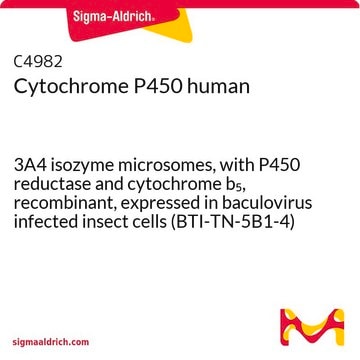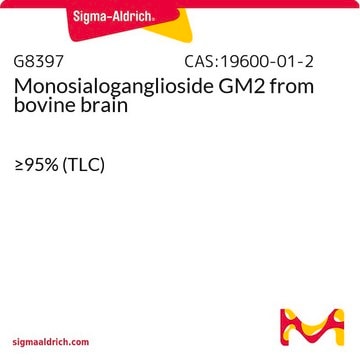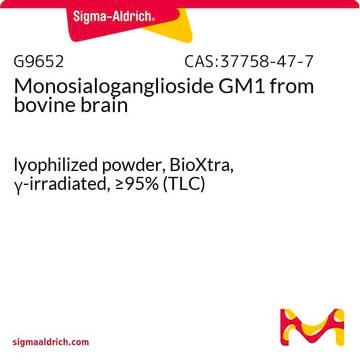G2392
Disialoganglioside GD1a from bovine brain
≥95% (TLC), lyophilized powder
Synonym(s):
Ganglioside GD1a, disialo from bovine brain
About This Item
Recommended Products
Quality Level
Assay
≥95% (TLC)
form
lyophilized powder
solubility
DMSO: soluble
storage temp.
−20°C
InChI
1S/C86H152N4O39.2Na/c1-6-8-10-12-14-16-18-20-22-24-26-28-30-32-34-36-51(100)50(90-60(105)37-35-33-31-29-27-25-23-21-19-17-15-13-11-9-7-2)46-118-80-69(111)67(109)72(57(43-94)120-80)123-82-71(113)78(129-86(84(116)117)39-53(102)62(88-48(4)98)77(128-86)65(107)55(104)41-92)74(59(45-96)122-82)124-79-63(89-49(5)99)75(66(108)56(42-93)119-79)125-81-70(112)68(110)73(58(44-95)121-81)126-85(83(114)115)38-52(101)61(87-47(3)97)76(127-85)64(106)54(103)40-91;;/h34,36,50-59,61-82,91-96,100-104,106-113H,6-33,35,37-46H2,1-5H3,(H,87,97)(H,88,98)(H,89,99)(H,90,105)(H,114,115)(H,116,117);;/q;2*+1/p-2/b36-34+;;/t50-,51+,52?,53?,54-,55-,56?,57?,58?,59?,61+,62+,63?,64-,65-,66?,67?,68?,69?,70?,71?,72?,73?,74?,75?,76?,77?,78?,79?,80?,81?,82?,85?,86?;;/m0../s1
InChI key
CWLDKTAXQZEVQN-CUEXFKMESA-L
Looking for similar products? Visit Product Comparison Guide
Amino Acid Sequence
General description
Application
- as a receptor for the detection of murine norovirus-1 (MNV-1) by RT-PCR
- as a glycolipid to study the interaction between protein human endogenous retrovirus W family pHERV-W ENV and glycolipids by enzyme-linked immunosorbent assay (ELISA)
- as a reference standard to analyze the ganglioside signatures of prostate cancer cells by high-performance liquid chromatography
Biochem/physiol Actions
Storage Class Code
11 - Combustible Solids
WGK
WGK 3
Flash Point(F)
Not applicable
Flash Point(C)
Not applicable
Certificates of Analysis (COA)
Search for Certificates of Analysis (COA) by entering the products Lot/Batch Number. Lot and Batch Numbers can be found on a product’s label following the words ‘Lot’ or ‘Batch’.
Already Own This Product?
Find documentation for the products that you have recently purchased in the Document Library.
Customers Also Viewed
Our team of scientists has experience in all areas of research including Life Science, Material Science, Chemical Synthesis, Chromatography, Analytical and many others.
Contact Technical Service









